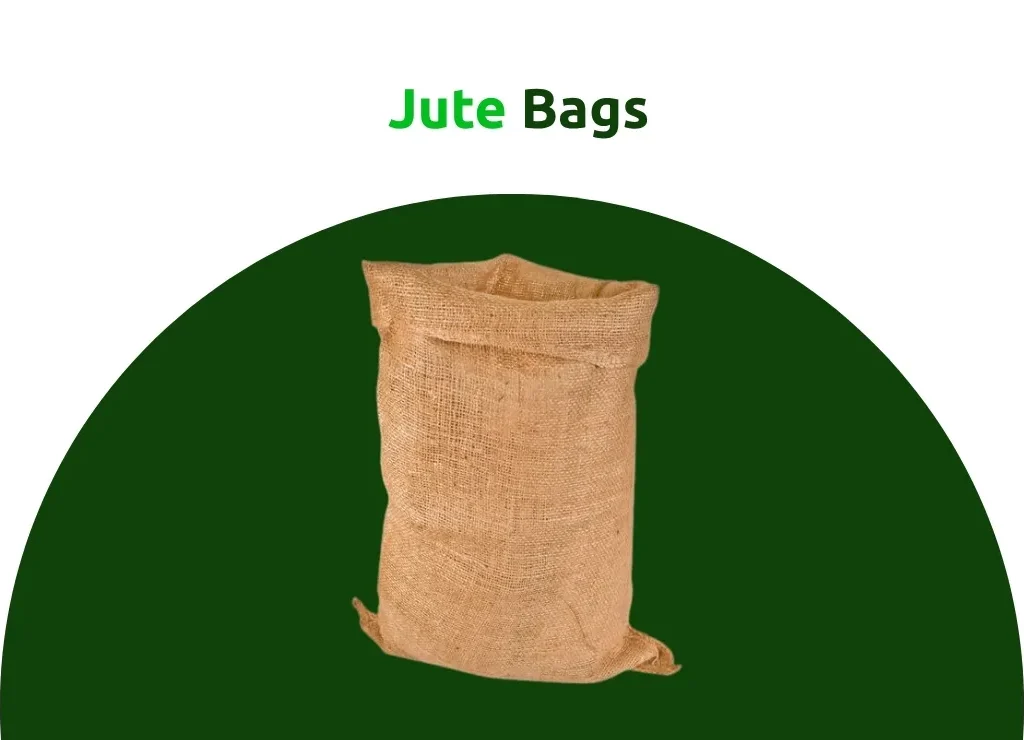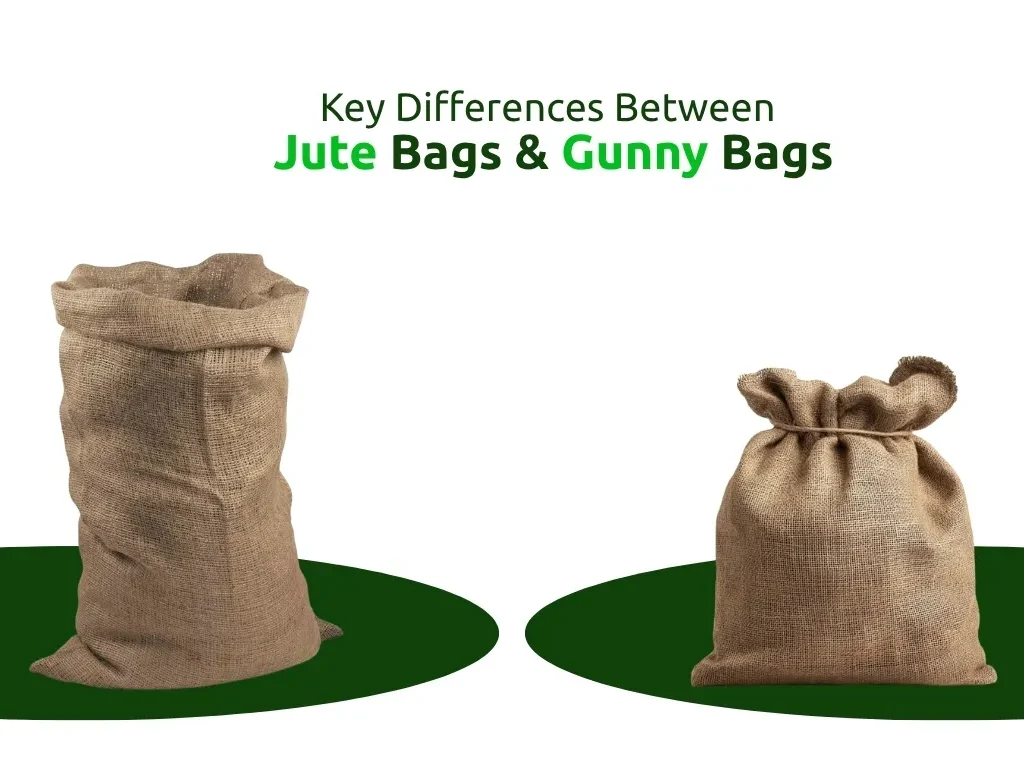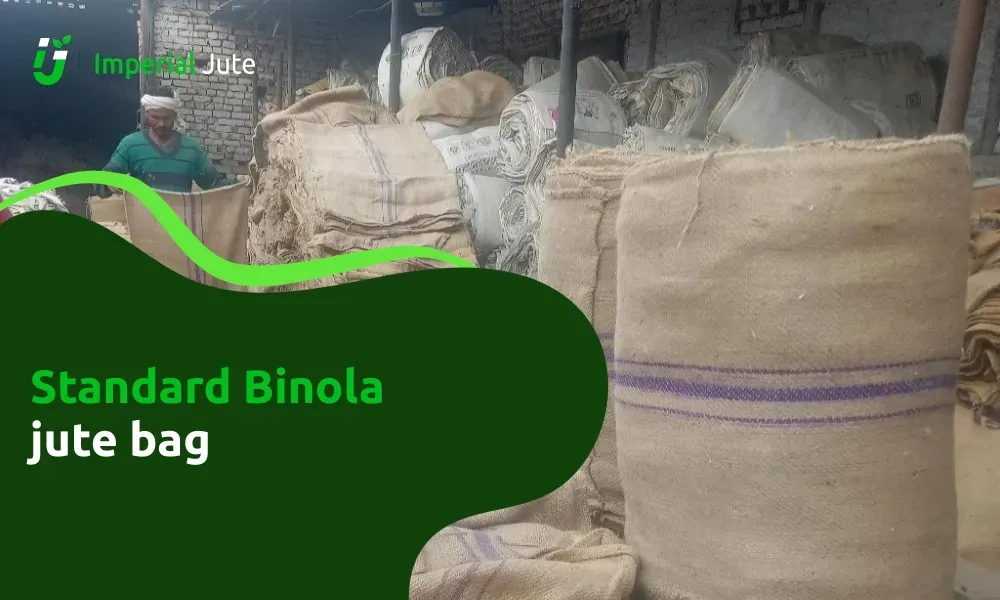Jute bags and gunny bags are both made from natural fibers, but they serve different purposes and have distinct characteristics.
As the world gravitates towards more sustainable practices, understanding the difference between these two types of bags becomes increasingly important, especially for industries involved in packaging, retail, and shipping.
In this blog post, we will explore the differences between jute bags and gunny bags, discussing their materials, uses, environmental impact, and other relevant aspects.

What are Jute Bags?
Jute bags have become a popular choice for eco-conscious businesses and consumers alike. Made from the fibers of the jute plant, these bags are known for their strength, durability, and biodegradability. They offer a sustainable alternative to plastic bags and are widely used across various industries, including retail, agriculture, and packaging.
Composition of Jute Bags
Jute is a natural fiber that is extracted from the stem of the jute plant, primarily grown in regions with warm, humid climates. The jute fibers are then spun into yarns, which are woven to create strong, durable fabric. Jute bags are made from this fabric, which is typically untreated and free from harmful chemicals, making them a safe and eco-friendly choice.
The key characteristics of jute bags are:
- Eco-friendly: Jute is 100% biodegradable and can be easily composted, unlike plastic.
- Durable: Jute bags are known for their strength and ability to carry heavy loads without tearing.
- Breathable: The natural fibers allow air to pass through, which makes jute bags suitable for storing perishable items like produce.
Applications of Jute Bags
Jute bags are versatile and are used in a wide range of applications, such as:
- Retail: Many retail businesses use jute bags as reusable shopping bags, often featuring branded logos or designs.
- Packaging: Jute bags are used for packaging items like textiles, grains, and organic products, offering a sustainable alternative to plastic packaging.
- Promotional Items: Jute bags are often used for promotional purposes because of their eco-friendly appeal, serving as branded giveaways at events and trade shows.
Jute bags are not just functional; they are also aesthetically appealing, often being crafted in vibrant colors and stylish designs. This makes them an ideal choice for businesses that want to promote their brand in an environmentally responsible way.

What are Gunny Bags?
Gunny bags, often referred to as burlap sacks, are another form of jute-based bags, but their characteristics and uses are quite different from jute bags. Traditionally used for bulk storage and transportation, gunny bags have been an essential part of the agricultural and shipping industries for centuries. They are known for their durability, rough texture, and utility in holding heavy goods.
Composition of Gunny Bags
Gunny bags, like jute bags, are made from jute fibers. However, gunny bags tend to be thicker and coarser compared to regular jute bags. The jute fibers used in gunny bags are often spun in a way that creates a more rugged fabric. Historically, gunny bags were crafted purely from jute, but nowadays, they may be made from a blend of jute and other fibers to increase strength or reduce production costs.
Some characteristics of gunny bags include:
- Rough Texture: Gunny bags are often left unrefined, which gives them a coarse texture suitable for heavy-duty usage.
- Heavy Duty: These bags are specifically designed for strength, making them ideal for storing and transporting bulk goods.
- Breathable: Just like jute bags, gunny bags allow air to pass through, which is essential for preserving the quality of stored products like grains and seeds.
Applications of Gunny Bags
Gunny bags are primarily used for heavy-duty applications, such as:
- Agriculture: Gunny bags are widely used for storing and transporting agricultural products, including grains, cereals, and seeds. Their strength and breathability make them ideal for these uses.
- Shipping and Logistics: In the shipping industry, gunny bags are used for packaging bulk materials, such as fertilizers, chemicals, and even certain types of food products.
- International Trade: Gunny bags are also crucial in international trade, especially for exporting bulk goods in developing countries, where they provide a cost-effective packaging solution for heavy products.
While gunny bags are typically not used for retail or promotional purposes, they are indispensable in industries that require bulk packaging and transportation of heavy goods.

Key Differences Between Jute Bags and Gunny Bags
Although both jute bags and gunny bags are made from the same natural fiber, jute, they have different uses, durability, and designs. Understanding these differences will help you choose the right bag for your needs.
1. Material Composition
Jute Bags: Jute bags are usually made from 100% natural jute fibers. These fibers are spun into a finer and softer thread, which is woven into a smooth fabric. Jute bags are often untreated and do not contain chemicals, making them a good eco-friendly option for retail and packaging.
Gunny Bags: Gunny bags are also made from jute, but they are constructed with thicker and coarser fabric. This makes them more durable and suited for heavy-duty use. Sometimes, gunny bags are mixed with other fibers to increase their strength and reduce costs.
2. Design and Functionality
Jute Bags: Jute bags are designed for use in retail, shopping, gifts, and eco-friendly packaging. They come in many sizes, shapes, and colors. These bags are lightweight and can be customized with logos and branding. Jute bags are made to be stylish and attractive to consumers who care about the environment.
Gunny Bags: Gunny bags are made for industrial and agricultural purposes. They have a rough texture and a simple, utilitarian design. These bags are large and durable, meant to hold heavy goods like grains, seeds, and chemicals. Their focus is on functionality rather than appearance.
3. Environmental Impact
Jute Bags: Jute is a biodegradable material. This means that jute bags break down naturally and have less impact on the environment compared to plastic bags. Jute is also grown with fewer pesticides and fertilizers, which reduces its environmental impact.
Gunny Bags: Gunny bags are also biodegradable because they are made from jute. However, they may have a bigger environmental footprint. This is because they are heavier and sometimes include synthetic fibers. The manufacturing process for gunny bags is more industrial, which can lead to higher carbon emissions.
Other Differences Between Jute Bags and Gunny Bags
1. Durability and Strength
Both jute bags and gunny bags are known for their strength, but they are designed to handle different types of tasks. Understanding their durability and strength will help you choose the right bag for your needs, whether you are looking for a lightweight shopping bag or a heavy-duty storage solution.
Durability of Jute Bags
Jute bags are designed to be durable and strong, but their strength is balanced with flexibility. They are ideal for carrying items like groceries, clothing, and promotional materials. Jute bags are made from tightly woven fibers, which makes them resistant to tearing and damage. However, they are not as strong as gunny bags when it comes to holding extremely heavy loads.
The durability of jute bags is also influenced by their treatment during production. For example, some jute bags are reinforced with additional stitching or fabric lining, increasing their strength and longevity.
Durability of Gunny Bags
Gunny bags are built to be tougher and more resilient than jute bags. These bags are often thicker and are made to withstand rough handling, making them ideal for heavy-duty applications like storing grains, seeds, and bulk materials. The thicker jute fabric, along with its more rugged construction, allows gunny bags to carry much heavier loads than jute bags.
Gunny bags are typically used in environments where durability is a top priority, such as in agriculture, shipping, and warehousing. While they may not have the refined design of jute bags, their strength makes them perfect for industrial uses.
2. Cost Factors of Jute Bags vs. Gunny Bags
Cost is an important consideration when choosing between jute bags and gunny bags. While both are made from natural fibers and offer eco-friendly benefits, there are differences in their production costs, uses, and long-term value. This section will help you understand the cost differences and how they might influence your decision.
Cost of Production
Jute Bags: The production of jute bags is generally more expensive than gunny bags. This is because jute bags are often designed with more refined craftsmanship, lighter fabrics, and more detailed finishing. Additionally, jute bags are frequently customized with prints, logos, or branding, which adds to the cost. The materials used in jute bags are also higher quality for consumer-facing products, resulting in a slightly higher production cost.
Gunny Bags: Gunny bags are less expensive to produce. They are made from thicker and rougher jute fabric, which is often more affordable than the finer jute used in bags for retail. The production process for gunny bags is more industrial, and they do not require the same level of customization or finishing, making them a more cost-effective option for bulk packaging needs.
Long-Term Investment
Jute Bags: While the initial cost of jute bags is higher, their long-term value can be significant. Jute bags are reusable and durable, which means they can be used multiple times before they need to be replaced. Businesses that invest in jute bags as shopping bags or promotional items will find that these bags help build a positive brand image and attract eco-conscious customers. Over time, the reusability of jute bags can offset their initial cost.
Gunny Bags: Gunny bags are a better choice for businesses focused on bulk packaging or agricultural needs. Although they have a lower upfront cost, they are designed for single-use or limited reusability. Gunny bags are best for industries where cost-effective storage and transportation are essential. However, due to their limited durability for repeated use, gunny bags may need to be replaced more frequently than jute bags in some applications.

Choosing the Right Bag for Your Needs
When choosing between jute bags and gunny bags, it’s important to consider the specific needs of your business or personal use. Whether you need a durable, eco-friendly shopping bag or a heavy-duty sack for agricultural purposes, understanding the differences between these two types of bags will help you make the right decision.
When to Choose Jute Bags
Jute bags are the perfect choice for businesses that want to promote sustainability and eco-friendliness. Some of the ideal situations for choosing jute bags include:
- Retail: Jute bags make excellent reusable shopping bags for eco-conscious consumers. Their customizable nature makes them ideal for branding and promotional purposes.
- Gift Packaging: Jute bags are often used for gift packaging because of their natural look and sturdy construction.
- Event Promotions: Companies use jute bags as giveaways at events, trade shows, and conferences to promote their green credentials.
- Eco-Friendly Packaging: Jute bags are a great choice for packaging organic products or any goods where environmental impact is a consideration.
When to Choose Gunny Bags
Gunny bags are a better fit for industrial and agricultural uses. You should consider gunny bags if:
- Agriculture: Gunny bags are ideal for storing and transporting bulk agricultural products, such as grains, seeds, and other heavy materials.
- Shipping and Logistics: For packaging bulk goods that need to be shipped or stored in large quantities, gunny bags are the most cost-effective and durable option.
- Heavy-Duty Storage: If you need a bag that can withstand the rough handling and weight of bulk goods, gunny bags are the way to go.
Frequently Asked Questions
What is the main difference between jute bags and gunny bags?
The main difference between jute bags and gunny bags is their design and purpose. Jute bags are typically finer, lighter, and designed for retail, shopping, and eco-friendly packaging.
Gunny bags, on the other hand, are thicker, coarser, and used primarily for heavy-duty applications such as storing and transporting bulk goods in agriculture and shipping.
Are jute bags stronger than gunny bags?
No, gunny bags are generally stronger and more durable than jute bags. While jute bags are designed for retail and consumer use, gunny bags are made from thicker, coarser jute fabric, making them better suited for carrying heavy materials like grains, seeds, and chemicals.
Can jute bags be reused?
Yes, jute bags are highly durable and can be reused multiple times. In fact, one of the main benefits of jute bags is their strength and reusability, making them a sustainable alternative to single-use plastic bags. Many businesses use jute bags as eco-friendly shopping bags or promotional items.
Are gunny bags eco-friendly?
Yes, gunny bags are eco-friendly because they are made from jute, a biodegradable natural fiber. However, they are generally not as widely used for retail purposes as jute bags, as they are designed more for heavy-duty, industrial applications. Still, their biodegradability makes them a better option than plastic bags.
Why are gunny bags more affordable than jute bags?
Gunny bags are more affordable because they are made with thicker, coarser jute fabric and are produced in a more industrial setting. They do not require as much customization or finishing as jute bags, which are designed for consumer-facing purposes and often have branding, color, and additional treatments that increase their cost.
Conclusion
Both jute bags and gunny bags have unique benefits, and understanding their differences will help you select the right option for your needs. Jute bags are more suitable for retail, packaging, and eco-friendly uses, while gunny bags are better for bulk storage, shipping, and agricultural applications. Whether you are focused on sustainability, cost-efficiency, or durability, both options offer natural, biodegradable solutions that reduce the need for harmful plastic products.
When choosing the right type of bag, consider your specific needs, budget, and long-term goals. Both jute bags and gunny bags have their place in today’s world, offering solutions that contribute to a more sustainable future.

